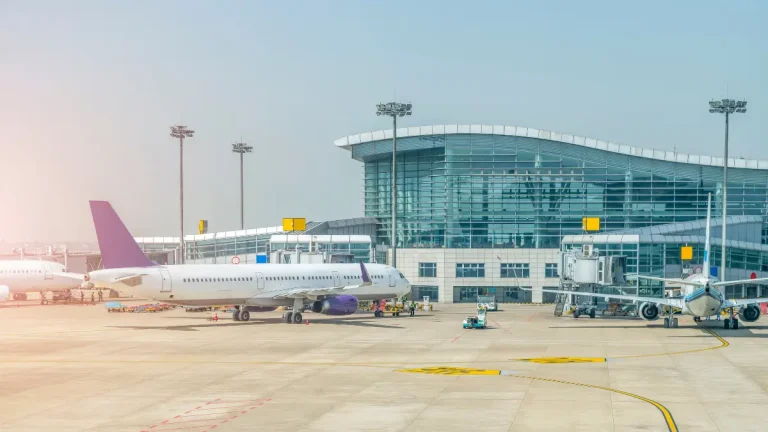As South Africa prepares to host the G20 Summit next month, questions are mounting over whether the country’s airports and major venues are ready to handle bomb threats or explosive emergencies.
Thank you for reading this post, don't forget to subscribe!Explosives expert Jimmy Roodt, operations director at Gauntlet Security Solutions, has warned that major airports- OR Tambo International, Cape Town International, and King Shaka International still lack bomb-specific safety measures. While his goal isn’t to raise alarm, he says it’s time to update protocols and align South Africa’s response systems with international aviation standards.
ALSO READ: Gauteng Plans Major Crackdown on Unsafe Taxis and Unlicensed Drivers
Roodt Calls for Modernised Safety Frameworks
Roodt argues that evacuation procedures at South African airports are still based on fire safety standards, not on systems designed for explosive threats.
“Fire standards send people outside. Bomb standards, depending on the situation, may require sheltering in place,” he explained. “The absence of a national framework tailored to blast mitigation means we could be using systems that are not designed for these types of emergencies.”
He said current evacuation drills don’t follow International Civil Aviation Organisation (ICAO) guidelines, which focus on blast containment and safe assembly zones.
With more than 30 years of experience in explosive ordnance management across 13 countries, Roodt said he has found assembly points at some airports positioned dangerously close to potential detonation zones.
“This is not about raising alarm, it’s about prevention and preparedness,” he said. “We need to ensure people are not guided into unsafe areas during an emergency.”
Authorities Stand by South Africa’s Security Systems
The South African Civil Aviation Authority (SACAA) insists that local aviation safety measures comply with international obligations under the Chicago Convention.
SACAA spokesperson Sisa Majola said the agency’s systems undergo regular external audits and remain under constant review.
“South Africa is a signatory to the Chicago Convention and undergoes regular international audits,” Majola said. “Our last ICAO security audit was conducted in 2022, and our systems are also tested by international partners such as the United States Transport Security Administration.”
He added that the country’s aviation security infrastructure is monitored continuously and upgraded as needed.
The Department of Transport confirmed that it had received correspondence from Roodt outlining his concerns and had referred the matter to Airports Company South Africa (ACSA) for investigation.
Department spokesperson Collen Msibi said:
“We take all safety-related correspondence seriously. The department has requested updates from ACSA to ensure that operational matters raised are addressed appropriately.”
At the time of publication, ACSA had not released a formal response.
Concerns Extend Beyond Airports
Roodt said the same vulnerabilities apply to large-capacity venues, malls, and conference centres — many of which will host G20-related events.
“The first tier of bomb threat mitigation lies with facility managers, employers, private security, and outsourced safety providers,” he said. “They are responsible for risk assessments, evacuation protocols, and properly trained staff. But this system is broken.”
He emphasised that the first line of defence is that those managing buildings and public spaces must be capable of identifying and mitigating risks before emergencies escalate.
Security experts agree that South Africa’s law enforcement and intelligence agencies have a strong operational capacity to respond to confirmed threats. However, Roodt said prevention at the ground level remains critical. Without properly trained staff or clear procedures, even the best police response teams can only react after the fact.
Why South Africa Needs Localised Safety Standards
South Africa’s safety codes still focus primarily on fire prevention, leaving a gap in blast-specific protection. Analysts have long called for a national bomb safety framework aligned with international benchmarks to close that gap.
The ICAO’s Annex 17 outlines global aviation security measures, from blast containment to assembly point design and reinforced shelters. Roodt believes these practices could easily be localised for South African conditions.
Adopting such standards, he said, would not only enhance passenger safety but also show the world that South Africa is serious about compliance and readiness as it hosts global leaders next month.
Building a Culture of Preparedness
Roodt and other safety professionals are pushing for collaboration between government agencies, airport authorities, and private operators. He believes practical steps like better training, clearer communication, and improved infrastructure could transform readiness.
He outlined key actions to strengthen South Africa’s safety systems:
- Develop a national bomb safety standard specific to South African conditions.
- Train facility managers and security teams to handle explosive threats.
- Conduct simulation-based emergency exercises that prepare staff for real scenarios.
- Launch public awareness campaigns so passengers and workers know how to respond.
“These initiatives could prevent panic, improve coordination, and ultimately save lives,” Roodt said. “This is not about assigning blame. It’s about bridging the gap between fire safety and blast safety before a crisis forces our hand.”
Turning Scrutiny Into Opportunity
Hosting the G20 puts South Africa’s security infrastructure under global scrutiny, but also gives it a chance to modernise outdated safety frameworks.
Experts say the challenge isn’t neglect but alignment: making sure that infrastructure, training, and protocols keep pace with today’s risks.
By acting now, South Africa can turn potential vulnerabilities into strengths, demonstrating leadership in public safety and risk management and setting a model for the rest of Africa.
Next Steps for South Africa’s Aviation Safety
Ensuring bomb-safety readiness at airports and major venues is about more than compliance; it’s about protecting lives and building trust. Strengthening coordination between aviation authorities, government departments, and private security specialists will be vital in the weeks leading up to the G20.
As Gauteng prepares to welcome world leaders, the goal is clear: protect through foresight, not reaction.




